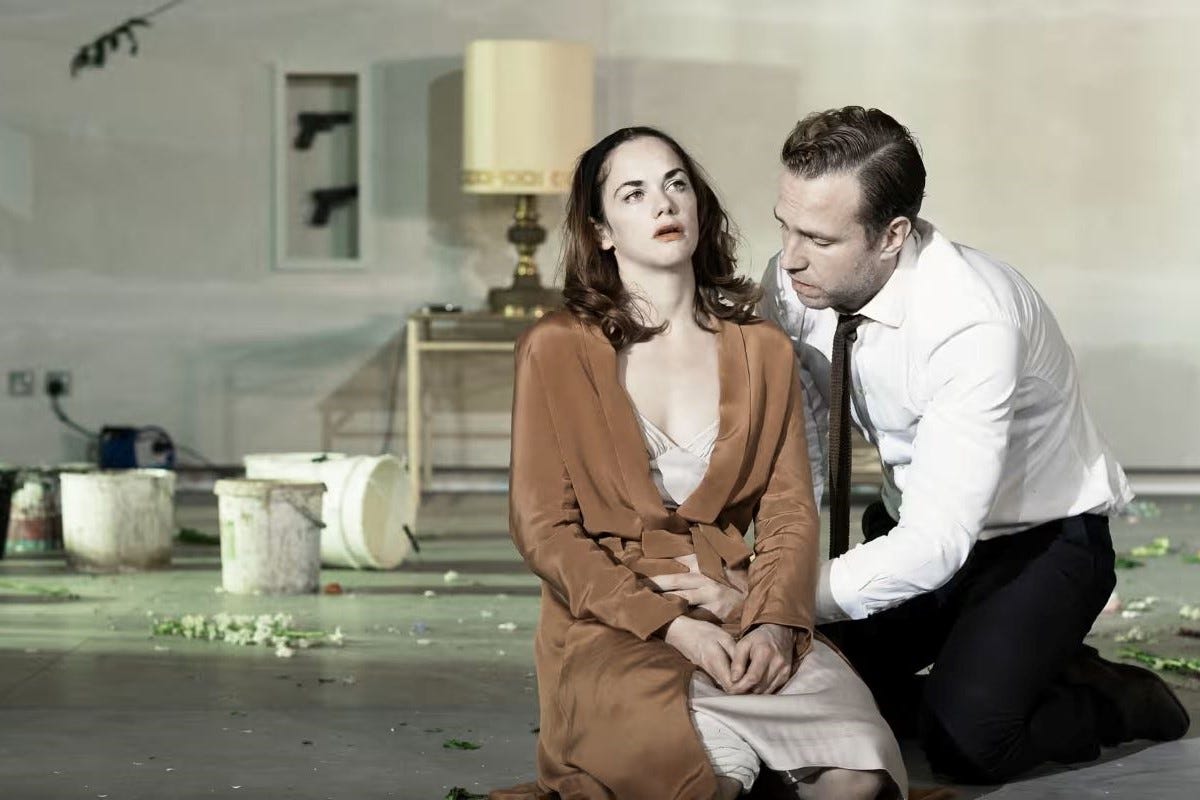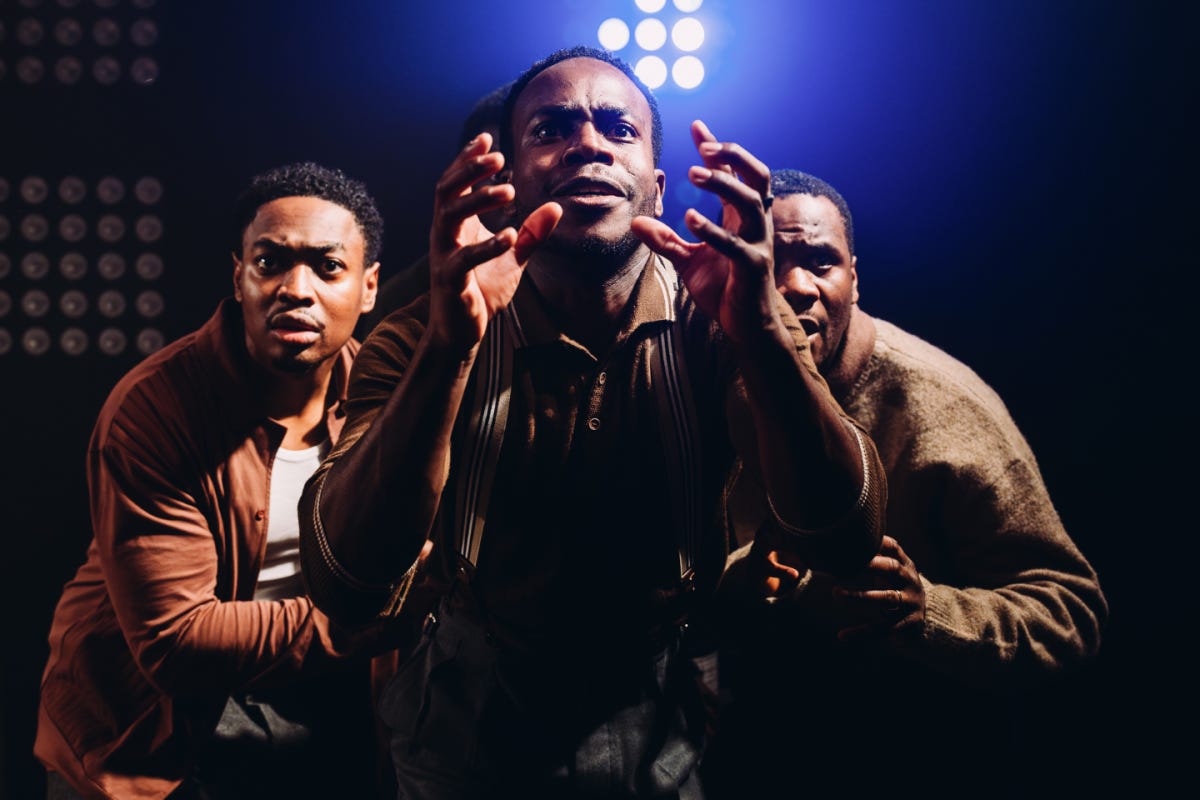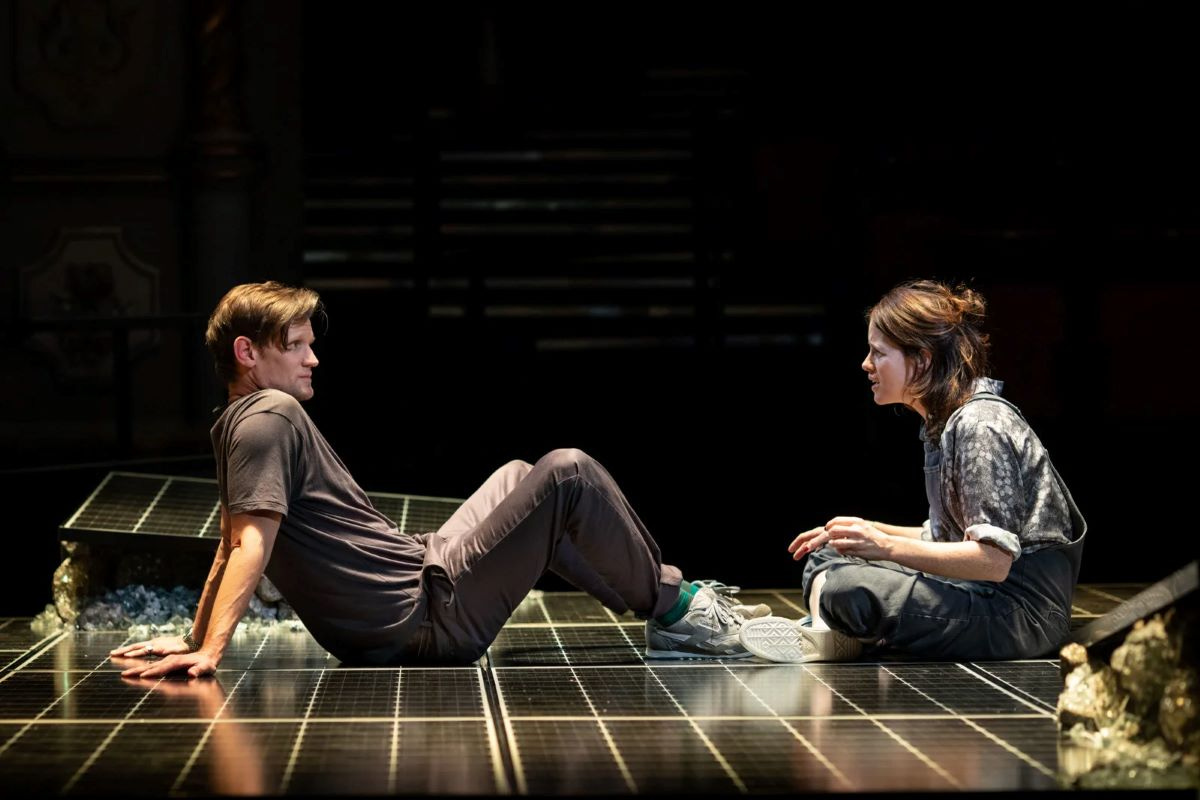Songs in shows can be devastatingly effective
Six critics on their favourite uses of music in theatre. Plus: three shows to see next week.
Hello, and welcome to The Crush Bar, a newsletter about theatre by Fergus Morgan.
This is the free Friday issue, which usually contains an interview with an exciting theatremaker or an essay on a theatre-related topic. This week, though, it is a crowd-written piece featuring a bunch of brilliant critics remembering their favourite use of a song in a show. After that, there are your usual recommendations for next week.
In case you missed it, here is this week’s issue of Shouts And Murmurs, which is a weekly round-up of the most interesting writing about theatre elsewhere…
You can get Shouts And Murmurs straight in your inbox every Tuesday - and help keep this newsletter going - by signing up as a paid supporter of The Crush Bar.
Theatres, companies, agencies and other organisations can now also sign-up as champion supporters of The Crush Bar, which gets their name in a dedicated tab on The Crush Bar’s Substack homepage and in the footer of every Friday issue.
Earlier this month, I went to see Thomas Ostermeier and Duncan Macmillan’s new version of The Seagull at the Barbican.
I loved it. I loved the dry despair of Macmillan’s adaptation. I loved the unapologetic eclecticism of Ostermeier’s staging, particularly the use of a thundering rain-curtain and a revving quad-bike. I loved the outrageous, angsty performances from the ludicrously starry cast, particularly Jason Watkins’ bedraggled teddy-bear turn as Sorin and Cate Blanchett’s obscenely over-the-top one as ageing actress Arkadina.
One moment from the show has stuck with me above all that, though. It came midway through the first half. Tom Burke’s Trigorin and Emma Corrin’s Nina were sat on camping chairs in front of an impenetrable thicket of grass plonked in the centre of the vast Barbican stage by designer Magda Willi. As their meandering conversation turned to the art of writing, Burke’s hitherto lethargic Trigorin gradually came alive. As he grew more and more animated, a song started playing over the sound system: Golden Brown by The Stranglers. Slowly, the song got louder and louder until it totally drowned Burke out. For at least a minute, as Burke’s Trigorin enthusiastically unfolded his thoughts on literature to Corrin’s Nina, all the audience could hear was the dulcet tones of Dave Greenfield and that iconic harpsichord riff. Then, the song faded away, as if it had never been there at all, and the production continued.
For some reason, I found it incredibly moving. Tear-jerking, in fact. I’ve been trying to work out why. It is difficult to put into words, but I think it had something to do with that scene being a rare moment of passion in the middle of a play otherwise largely concerned with miserable people moping about. Amid an ocean of existential ennui and unrequited love, here were two people on an island of joy, swept up in a compulsive conversation about art. That is a moving enough moment in itself, but for Ostermeier to underscore it with music was a dazzling directorial decision. If I ever get the chance, I would love to ask him what made him pick that particular song.
Using a song like that - to clarify, I mean inserting an existing song into a play, not incorporating one into the actual drama by having a character turn a radio on or something, or having someone burst into song like in a musical - is a delicate business. When done clumsily, it can ruin a show. Does anyone remember Ivo Van Hove’s production of Hedda Gabler at the National Theatre with Ruth Wilson in 2016? I do, but the main thing I recall is how the plaintive strains of Joni Mitchell’s Blue echoed through the theatre on no fewer than four different occasions. It felt a bit on-the-nose: this is a show about a sad woman, so here is a famous song about one, too.
I can also think of times when the use of a song has felt unearned, when the drama has not reached enough of an emotional pitch to warrant one, and a director has fallen back on a song to generate sentiment the action cannot evoke. There are shows where it would be bizarre to use a song, too: I’m not sure unexpectedly adding Pink Pony Club into an Alan Bennett play would work, for example, although maybe it would. And, of course, there are times when silence is golden. Regular readers will know how often I think about Vanessa Kirby and Toby Menzies almost kissing in Rob Icke’s version Uncle Vanya in 2016. A song would definitely have spoiled the unbearable tension.
When done judiciously, though, working a song into a show can be devastatingly effective. Sometimes, it is just cool, like in Jez Butterworth’s The Hills Of California, when Laura Donnelly’s estranged daughter returned to her family home to the muted sound of The Rolling Stones’ Gimme Shelter. Sometimes, it is desperately moving, like in Ebenezer Bamgboye’s staging of The Lonely Londoners, when the four Caribbean characters, battered and bruised by their experiences, stumbled across the stage while the extended version of Michael Kiwanuka’s Cold Little Heart played over the speaker system. And, sometimes, you just can’t put your finger on why it works, but it does.
That is because theatre, at its most transcendent, holds multiple layers of meaning simultaneously, creating a matrix of intersecting ideas and emotions, a metaphysical fabric of senses and sentiments, which would be almost impossible to articulate were you crass enough to try. Ineffable is the word, I think. Yep. At its best, theatre is ineffable. Songs, though, with their wealth of conscious and subconscious associations, have a magical capacity to give expression to the inexpressible, to eff the ineffable. They can stand in for all the things we cannot say with words. And, when deployed smartly in theatre they can give voice to that indescribable matrix. In theatre, like in life, the right song at the right time can evoke all the complexities and contradictions, knots and nuances, ironies and idiosyncrasies of human experience.
Does that make any sense at all? No, I thought not. I’ll tell you what. Here are six more critics picking their favourite uses of songs on stage. Maybe that will help.
Six critics pick their favourite songs on stage
Rosemary Waugh: There She Goes, My Beautiful World by Nick Cave & The Bad Seeds in Lungs at the Old Vic
This isn’t a play I planned to like. A smug two-hander with a celeb pairing - Claire Foy and Matt Smith - representing the everycouple living their everycouple existence, debating everycouple existential concerns. I hate the triteness of the central question of the piece – reducing whether to have a child to a debate about CO2 usage – but that’s not Duncan Macmillan’s fault, that’s my fault for finding it the definition of nihilism and a tiresome attempt at sounding intellectual and…. blah blah blah. Despite all the grumpy baggage I came with to the Old Vic, though, the truth is that I accidentally did like this warm and funny and endearing play, not least because right at the end of Matthew Warchus’s production there was a huge blast of Nick Cave – I’m pretty sure it was There She Goes, My Beautiful World but memory is a tricksy thing – and it was like this huge, silly, Globe-style jig where all the tension dissipates and you forgive a play for all its irritants, just like you forgive a carbon-footprint-causing toddler for all its irritants when you hear them shout-singing Twinkle Twinkle Little Star on repeat to themselves in the dark when they are meant to be having a nap.
Kate Wyver: Toothpaste Kisses by The Maccabees in The Backseat Of My Car (And Other Places) in Bristol
I'm pretty certain we were actually in the front seat. Greg Wohead's phone was on the dashboard, playing the tinny sound of Toothpaste Kisses by The Maccabees. The one-on-one show took place entirely in that car, which was parked in a rubble-filled lot in Bristol. It was told largely in the second person, putting me into the position of Wohead’s maybe-more-than-friend. I was wearing a wig. As the song played, we leaned in close. The proximity, the crap quality of the music and the prickling question of whether I was actually supposed to kiss this stranger created an electric intimacy. Whenever I hear The Maccabees, I think of that moment.
Holly Williams: Smells Like Teen Spirit by Nirvana in Three Sisters at the Young Vic
This is maybe a bit obvious, but I've gone back to what I think was one of the first big “ooh a modern song in an old play” moments, which surely influenced the likes of Rob Icke: Smells Like Teen Spirit in Benedict Andrews's Three Sisters at the Young Vic in 2012. I actually have a terrible memory for specifics and it was 13 years ago, so it is possible I mostly remember this because every single review and discussion of that show always mentions it... but I'm also pretty sure I am recalling my own inner excitement at watching the whole cast leaping and head-banging around the stage with total abandon to Nirvana. And I also get why it was always mentioned, because it was a moment that kind of encapsulated the production's general energy and freshness and ballsiness, shorthand for “this is not your usual Chekhov.” Except now, of course, adding modern songs is your usual Chekhov. Honourable mention on this front: Dead Centre's use of Miley Cyrus’ Wrecking Ball in Chekhov's First Play.
Natasha Tripney: The Parting Glass in Sh!t Theatre’s Or What’s Left Of Us
The Parting Glass is a folk song usually sung as people go their separate ways. The clue is in the title. It is a song of departure, of last goodbyes, a song engineered to bring a tear to the eye. Music has always played a key role in Sh!t Theatre’s work. Rob Jecock Is An Adult Baby, from Letters To Windsor House, their still depressingly relevant show about the psychological toll of renting in London, is an earworm par excellence (though I would strongly recommend not trying to track it down on YouTube, as I recently did with somewhat upsetting results). Their most recent show Or What’s Left of Us is steeped in song. It is ostensibly a show about the UK folk scene, the characters it attracts and what happens when you get off your tits at a folk festival, but under all that it’s a show about loss, about still-raw grief and how you continue to function after losing someone suddenly. Having already sung a number of folk standards replete with imagery of death and renewal while talking around but not explicitly about death, they launched into The Parting Glass and I suspect there were very few dry-eyed people in the room by the time they reached the final chorus.
Me: Not Dark Yet by Bob Dylan in Hamlet at the Almeida Theatre
I think Rob Icke deployed this song several times in his staging of Hamlet with Andrew Scott, but the moment I remember most vividly came towards the end, possibly even after Hamlet had been caught by Laertes’ poisoned blade and was readying himself for death. Hamlet’s late loved ones - his father, Ophelia, Polonius, basically everyone - could be seen chatting and laughing through the frosted glass at the back of the stage. Scott’s Hamlet just stood watching, waiting to join them, while Not Dark Yet filled the theatre. It was a beautiful moment, as all of Hamlet’s grief, anger, and uncertainty ebbed away in his final moments to Dylan’s plaintive tune.
Tim Bano: Everywhere by Fleetwood Mac in A Very Expensive Poison the Old Vic
Putin has just had Alexander Litvinenko murdered. The comically goofy killers escape to a Soho nightclub and the stage of the Old Vic fills with dancers, penises, and absurd cardboard cut-out puppets doing kick lines while Reece Shearsmith’s Putin looks on with glee from a royal box. This is Lucy Prebble’s wonderful, terrifying play A Very Expensive Poison, and to add to the chaos - the seesawing sense of farce and horror - the nightclub fills with the overamped sound of Everywhere by Fleetwood Mac. Then, the puppets and phalluses and chorines disappear until it’s just Alexander and his wife Marina - Tom Brooke and MyAnna Buring - left on stage together, locked in a tender slow dance to a song that suddenly means something very different.
What is your favourite use of a song on stage?
You can let me know in The Crush Bar’s Substack sporadic chat. If enough of you post some good replies, then maybe I will make a playlist or something! That would be fun!
Three shows to see next week
Personal Values - Hampstead Theatre Downstairs, until May 17
Chloë Lawrence-Taylor’s hour-long debut play features Rosie Cavaliero as Bea, a middle-aged woman driven to hoarding by grief after the death of her father, and Holly Atkins as her estranged sister Veda, who arrives to patch up their relationship, plus Archie Christoph-Smith as Veda’s adolescent son Ash. Director Lucy Morrison’s production has got some great reviews, with The Stage’s Holly O’Mahoney praising it as “a tender story of messy, love-hate family relationships, regrets and debilitating nostalgia” underscored by a “glimmering layer of magical realism.” You can read O’Mahoney’s four-star review here and you can get tickets via the button below.
Lessons On Revolution - Jermyn Street Theatre, until May 3
This piece of documentary theatre was a quiet hit at last year’s Edinburgh Fringe. Devised and performed by Sam Rees and Gabriele Uboldi, it uses projection, audience participation and more to deftly explore the parallels between the student protests that exploded at the London School of Economics in 1968 over the institution’s links to Rhodesia, and the precarity of life as a contemporary Londoner. Now, it transfers to the Jermyn Street Theatre for a brief run. You can get tickets via the button below.
Studio3 Season - Tron Theatre, until May 17
Director Jemima Levick took over at the Glasgow’s Tron Theatre in 2024 after several years at the city’s long-running lunchtime theatre A Play, A Pie and A Pint. Now, she has raided the archives of her old stomping ground and unearthed three hour-long three-handers, which she is staging in repertory at her new venue. Jo Freer, Dani Heron and Kevin Lennon will perform Isla Cowan’s Alright Sunshine, Meghan Tyler’s Fleg and Frances Poet’s Fruitcake on rotation, with direction from Debbie Hannan, Dominic Hill and Levick herself. You can get tickets via the button below.
Thanks for reading and supporting The Crush Bar
Thanks to all 4233 subscribers, to all 133 paid supporters, and particularly to The Crush Bar’s champion supporters, whose contributions make all this possible.
The Royal Court Theatre, Ellie Keel Productions, The Women’s Prize For Playwriting, Francesca Moody Productions, Raw Material Arts, Jermyn Street Theatre; Hampstead Theatre; Storytelling PR.
Your organisation can become a champion supporter of The Crush Bar, join that list, and help keep its independent coverage of theatre going via the button below.
That is it for this week. If you want to get in touch about anything raised in this issue - or anything at all - just reply to this newsletter, or email me at fergusmorgan@hotmail.co.uk, or you can find me on Bluesky.
Fergus










I thought of Robert Ike’s Dylan haunted Hamlet here too, especially It’s Not Dark Yet at that exact moment, although One More Cup of Coffee after that was just as good at triggering the perfect closing mood for that production. Also very happy to be reminded of Wrecking Ball in Chekhov’s First Play, loved that at the time.
The play Lucy used Taylor Swift’s Anti-Hero for a scene where the creepy nanny is playing with her young charge. It was early 2023 so the song had was still in heavy rotation. As a meta commentary on the character I guess it worked, I still wonder if Taylor read the play before approving its use or if she was ever aware of the play at all.